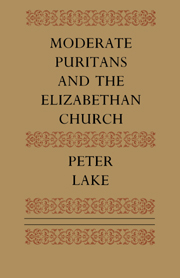Book contents
- Frontmatter
- Contents
- Dedication
- Preface
- 1 Introduction: Laurence Chaderton and the problem of puritanism
- 2 Moderate beginnings: the case of Edward Dering
- 3 Chaderton's puritanism
- 4 The moderate puritan divine as anti-papal polemicist
- 5 Thomas Cartwright: the search for the centre and the threat of separation
- 6 William Whitaker's position as refracted through his anti-papal polemic
- 7 Theory into practice: puritan practical divinity in the 1580s and 1590s
- 8 William Whitaker at St John's: the puritan scholar as administrator
- 9 The theological disputes of the 1590s
- 10 Conformity: Chaderton's response to the Hampton Court Conference
- 11 William Bradshaw: moderation in extremity
- 12 Conclusion
- Notes
- Bibliography
- Index
9 - The theological disputes of the 1590s
Published online by Cambridge University Press: 16 October 2009
- Frontmatter
- Contents
- Dedication
- Preface
- 1 Introduction: Laurence Chaderton and the problem of puritanism
- 2 Moderate beginnings: the case of Edward Dering
- 3 Chaderton's puritanism
- 4 The moderate puritan divine as anti-papal polemicist
- 5 Thomas Cartwright: the search for the centre and the threat of separation
- 6 William Whitaker's position as refracted through his anti-papal polemic
- 7 Theory into practice: puritan practical divinity in the 1580s and 1590s
- 8 William Whitaker at St John's: the puritan scholar as administrator
- 9 The theological disputes of the 1590s
- 10 Conformity: Chaderton's response to the Hampton Court Conference
- 11 William Bradshaw: moderation in extremity
- 12 Conclusion
- Notes
- Bibliography
- Index
Summary
THE OPENING SHOTS
On 29 April 1595 William Barrett, a fellow of Caius College, preached a sermon to the university from the pulpit of Great St Mary's. His sermon concerned the nature and extent of Christian assurance. He denied, in short, that such assurance was either possible or desirable for the ordinary believer. No one, in this uncertain world, he argued, could aspire to believe in the certainty of his own salvation, at least not with the certainty of faith, unless he had been vouchsafed a personal revelation from God concerning his own spiritual state. As for Christ's prayer that man's faith should not fail, which was often cited in support of the extreme view of assurance, Barrett restricted its application to the Apostle Peter alone. He concluded that to be thus certain and secure concerning one's own perseverance (something by its very nature dependant on contingent circumstances and events) was to be guilty of very great pride and impiety. While the remission of sins was to be accepted as an article of faith, that did not extend to its application to individuals. Men neither could nor should believe with complete faith or certainty that their own sins were forgiven and remitted. For Barrett faith was unitary. There was no distinction to be drawn between different types of faith, merely between different types of believer. Applying such ideas to the doctrine of predestination he asserted that ‘sin was the proper and first cause of reprobation’.
- Type
- Chapter
- Information
- Moderate Puritans and the Elizabethan Church , pp. 201 - 242Publisher: Cambridge University PressPrint publication year: 1982
- 1
- Cited by



